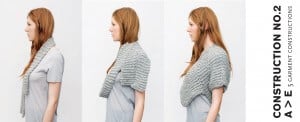The husband and wife are business partners in Construction Knitting which recently scooped the Textile + Services Design category in the 2011 Melbourne Design awards. The winning holistic design package is a DIY knitting kit – a collaboration they have been working on for some years.
The challenge, says Anthony, was to create garment designs that also worked graphically. Nikki based the Construction No 3 pattern on a square, which can be quickly formed using chunky yarn on 15mm needles. The separate pieces can then be stitched together in a variety of ways to provide an array of knitwear items.
Originally from Melbourne where they maintain a high design profile, the couple moved to Hawke’s Bay last year when Anthony took up his position with EIT’s School of Arts and Design. The basis of their joint business venture is very much grounded in Hawke’s Bay.
Silk, wool, alpaca, cashmere and possum scraps sourced from a small local mill are spun into a yarn that comes in four colour ways. Branded as “Wooli”, the balls can be purchased online together with pattern kits and supersized knitting needles.
Anthony says the mill remnants are being “upcycled” rather than treated as waste.
“Sustainability is a biggie for us, as is doing things in a hands-on way. It’s very much an in-house venture, from coming up with the concept through to packaging up and posting out the pattern kits.”
The aim, the couple say, has been to get away from the knitting’s nana image by creating a product that has contemporary appeal.
A knitter for as long as she can recall, Nikki also designs and hand-makes finely detailed garments for the boutique fashion industry. Her work featured alongside internationally acclaimed knitwear designers including Issey Miyake in a book and exhibition entitled The Endless Garment: The New Craft of Machine Knitting.
In a technology-driven world, neither business partner assumes everyone can knit. Nikki also runs workshops, which attracts both men and women who have never done knitting before.
Anthony says the DIY knitting kits are being sold mainly to buyers in the USA, mainland Europe and Canada.
The online shop is their access point, but the pattern kits also sell in selected Melbourne stores, Napier’s House of Aroha plus a few other retail outlets in New Zealand.”

